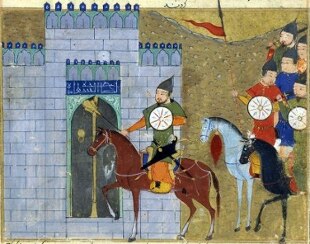Genghiz Khān apple of discord: the Russians want to celebrate his defeat, the Tatars do not
2019-11-14T18:01:36.030Z

November 11 is an important date for Russia: it is the day of liberation in 1480 from the Tatar-Mongol yoke, after 250 years of slavery. The date is a recurrence of the historical event called "great coping on the Ugra river". In the period from 30 September to 11 November 1480, the forces of Akhmat Khan, of the Great Horde, heir of Genghiz Khān, and those of Grand Duke Ivan III of Moscow, who determined the retreat of the Tatar-Mongols and, subsequently, the disintegration of the Horde. In reality there was no battle, but the compactness and conviction of the Russians (who defended their land from predators) caused the Tatars to withdraw, thus freeing Russia from slavery and tributes to the Great Horde, but also from the humiliating procedure for the establishment of the great princes of Moscow with the approval of the Tatars, preceded by the rich gifts of the great Russian princes. The Ugra river is located near Kaluga, the hilly region of the Russian central Rialto, 188 km southwest of Moscow, and the governor of the region Anatolij Artamonov proposed to give the historic event the status of a great national holiday. According to the governor, the initiative has already found the support of the "overwhelming majority of Russian citizens" and, above all, "of Russian President Vladimir Putin". For the governor the celebration of the "great coping on the Ugra river" would produce massive flows of public money, but also of tourists. In fact, in the Kaluga region, from 2017 every November 11th, historical costumed representations of that event are held. The problem, however, is that the Tatars of the Russian region of Tatarstan, the Kazan capital, almost 4 million inhabitants, 50% of the Tatar ethnic group, the direct descendants of Genghiz Khān, do not want to know about this 'party'. The Tatar regional government, where among other things the Tatar has the status of second official language after the Russian, has branded the initiative as a division, which would sow discord in a multi-ethnic society like the present one. The Crimean Tatars, whose ancestors at the time were allies of the Russians against the forces of Akhmat Khan, did not pronounce themselves. The last word on the matter now lies directly with Russian President Vladimir Putin. <iframe width = "600" height = "338" src = "https://www.youtube.com/embed/EDMmAPdCe1E" frameborder = "0" allow = "accelerometer; autoplay; encrypted-media; gyroscope; picture-in -picture "allowfullscreen> </iframe>
Share
November 14, 2019 November 11 is an important date for Russia: it is the day of liberation in 1480 from the Tatar-Mongol yoke, after 250 years of slavery. The date is a recurrence of the historical event called "great coping on the Ugra river". In the period from 30 September to 11 November 1480, the forces of Akhmat Khan, of the Great Horde, heir of Genghiz Khān, and those of Grand Duke Ivan III of Moscow, who determined the retreat of the Tatar-Mongols and, subsequently, the disintegration of the Horde. In reality there was no battle, but the compactness and conviction of the Russians (who defended their land from predators) caused the Tatars to withdraw, thus freeing Russia from slavery and tributes to the Great Horde, but also from the humiliating procedure for the establishment of the great princes of Moscow with the approval of the Tatars, preceded by the rich gifts of the great Russian princes. The Ugra River is located near Kaluga, the hilly region of the Russian central Rialto, 188 km southwest of Moscow, and the governor of the region Anatoly Artamonov proposed to give the historic event the status of a great national holiday. According to the governor, the initiative has already found the support of the "overwhelming majority of Russian citizens" and, above all, "of Russian President Vladimir Putin". For the governor the celebration of the "great coping on the Ugra river" would produce massive flows of public money, but also of tourists. In fact, in the Kaluga region, from 2017, every November 11th, historical costumed representations of that event are held. The problem, however, is that the Tatars of the Russian region of Tatarstan, the Kazan capital, almost 4 million inhabitants, 50% of the Tatar ethnic group, the direct descendants of Genghiz Khān, do not want to know about this 'party'. The Tatar regional government, where among other things the Tatar has the status of second official language after the Russian, has branded the initiative as a division, which would sow discord in a multi-ethnic society like the present one. The Crimean Tatars, whose ancestors at the time were allies of the Russians against the forces of Akhmat Khan, did not pronounce themselves. The last word on the matter now lies directly with Russian President Vladimir Putin.

